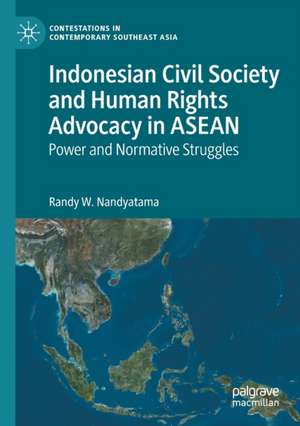Indonesian Civil Society and Human Rights Advocacy in ASEAN: Power and Normative Struggles: Contestations in Contemporary Southeast Asia
Autor Randy W. Nandyatamaen Limba Engleză Paperback – 2 aug 2022
| Toate formatele și edițiile | Preț | Express |
|---|---|---|
| Paperback (1) | 780.19 lei 6-8 săpt. | |
| Springer Nature Singapore – 2 aug 2022 | 780.19 lei 6-8 săpt. | |
| Hardback (1) | 784.13 lei 6-8 săpt. | |
| Springer Nature Singapore – aug 2021 | 784.13 lei 6-8 săpt. |
Preț: 780.19 lei
Preț vechi: 951.46 lei
-18% Nou
Puncte Express: 1170
Preț estimativ în valută:
149.30€ • 154.25$ • 124.19£
149.30€ • 154.25$ • 124.19£
Carte tipărită la comandă
Livrare economică 19 martie-02 aprilie
Preluare comenzi: 021 569.72.76
Specificații
ISBN-13: 9789811630958
ISBN-10: 981163095X
Ilustrații: XV, 278 p. 2 illus.
Dimensiuni: 148 x 210 mm
Greutate: 0.39 kg
Ediția:1st ed. 2021
Editura: Springer Nature Singapore
Colecția Palgrave Macmillan
Seria Contestations in Contemporary Southeast Asia
Locul publicării:Singapore, Singapore
ISBN-10: 981163095X
Ilustrații: XV, 278 p. 2 illus.
Dimensiuni: 148 x 210 mm
Greutate: 0.39 kg
Ediția:1st ed. 2021
Editura: Springer Nature Singapore
Colecția Palgrave Macmillan
Seria Contestations in Contemporary Southeast Asia
Locul publicării:Singapore, Singapore
Cuprins
Chapter 1. Searching for the ‘Unsung Hero’: Civil Society Organisations in ASEAN?.- Chapter 2. The Practice of Human Rights Norm Dynamics in ASEAN.- Chapter 3. Indonesia and Human Rights in ASEAN.- Chapter 4. Exploring Indonesian CSOs’ Normative Positions on Human Rights in ASEAN.- Chapter 5. Indonesian CSOs’ Political Strategies for ASEAN Human Rights Advocacy.- Chapter 6.Indonesian CSOs’ Power Relations in the Field of ASEAN.- Chapter 7. Conclusion: Competing CSOs’ Advocacy and the ASEAN Human Rights Agenda.
Notă biografică
Randy W. Nandyatama is Assistant Professor in International Relations at Gadjah Mada University.
Textul de pe ultima copertă
“Randy Nandyatama offers a pathbreaking study of ASEAN’s human rights turn, as seen through the lens of Indonesian civil society actors and human rights advocates. In his application of Bourdieu, he offers an innovative and ambitious approach to understanding human rights norms across the region, using the case of Indonesia to explore engagement practices among civil society organisations, and at the national and ASEAN regional levels. A highly recommended addition to the literature!”
— Assoc. Prof. Anthony J. Langlois, Flinders University, Australia
“Constructivist studies of ASEAN regionalism can be as state-centric as their realist counterparts. Randy Nandyatama offers a refreshing re-examination of that orthodoxy. Focusing on human rights advocacy by civil society organizations in Indonesia, Nandyatama’s fascinating book explores their complex negotiations with the pre-existing ‘doxa’ in ASEAN regionalism—the legal–rational and socio[1]cultural norms of the “ASEAN Way”—that shape the conditions of normative and political possibility for human rights in Southeast Asia. I highly recommend it”. — Professor See Seng Tan, S. Rajaratnam School of International Studies, Nanyang Technological University, Singapore
“Indonesian democracy remains flawed as long as the human rights of its minority groups are threatened. Yet the book examines newer dynamics spurred by Indonesian CSO attempts at transnational advocacy—in a region with an ambiguous relationship with human rights—in especially when its principles infringe on the interests of states and powerful domestic actors. These dynamics are deciphered through detailed empirical analysis and distinctive use of a Constructivist IR approach influenced by Bourdieu’s sociology”.
— Prof. Vedi Hadiz, University of Melbourne, Australia This book focuses on how Indonesian civil society organisations interact with ASEAN to shape human rights institutionalisationin the region. Using Bourdieu-inspired constructivist IR as an analytical lens, the book argues that there are pre-reflexive norms that dominate the field of interaction in the region that shape the way civil society organisations operate. This has resulted in the diverging advocacy practices, thus complicating human rights institutionalisation process in ASEAN.
Randy W. Nandyatama is Assistant Professor in International Relations at Gadjah Mada University.
“Constructivist studies of ASEAN regionalism can be as state-centric as their realist counterparts. Randy Nandyatama offers a refreshing re-examination of that orthodoxy. Focusing on human rights advocacy by civil society organizations in Indonesia, Nandyatama’s fascinating book explores their complex negotiations with the pre-existing ‘doxa’ in ASEAN regionalism—the legal–rational and socio[1]cultural norms of the “ASEAN Way”—that shape the conditions of normative and political possibility for human rights in Southeast Asia. I highly recommend it”. — Professor See Seng Tan, S. Rajaratnam School of International Studies, Nanyang Technological University, Singapore
“Indonesian democracy remains flawed as long as the human rights of its minority groups are threatened. Yet the book examines newer dynamics spurred by Indonesian CSO attempts at transnational advocacy—in a region with an ambiguous relationship with human rights—in especially when its principles infringe on the interests of states and powerful domestic actors. These dynamics are deciphered through detailed empirical analysis and distinctive use of a Constructivist IR approach influenced by Bourdieu’s sociology”.
— Prof. Vedi Hadiz, University of Melbourne, Australia This book focuses on how Indonesian civil society organisations interact with ASEAN to shape human rights institutionalisationin the region. Using Bourdieu-inspired constructivist IR as an analytical lens, the book argues that there are pre-reflexive norms that dominate the field of interaction in the region that shape the way civil society organisations operate. This has resulted in the diverging advocacy practices, thus complicating human rights institutionalisation process in ASEAN.
Randy W. Nandyatama is Assistant Professor in International Relations at Gadjah Mada University.
Caracteristici
Draws upon Bourdieu’s field theory to analyse the political engagement between CSOs and the trajectory of the human rights agenda in ASEAN Highlights the trend of the ‘practice turn’ in IR and the efficacy of adopting such a novel approach in enhancing our understanding of ASEAN regionalism Avoids simplified approaches to modelling international politics as a series of rational actions Maps the existing dominant norms and political resources as well as social struggles among related actors Departs from constructivist IR analyses and offers a more sensitive and comprehensive assessment of the push for institutionalisation of human rights in ASEAN





